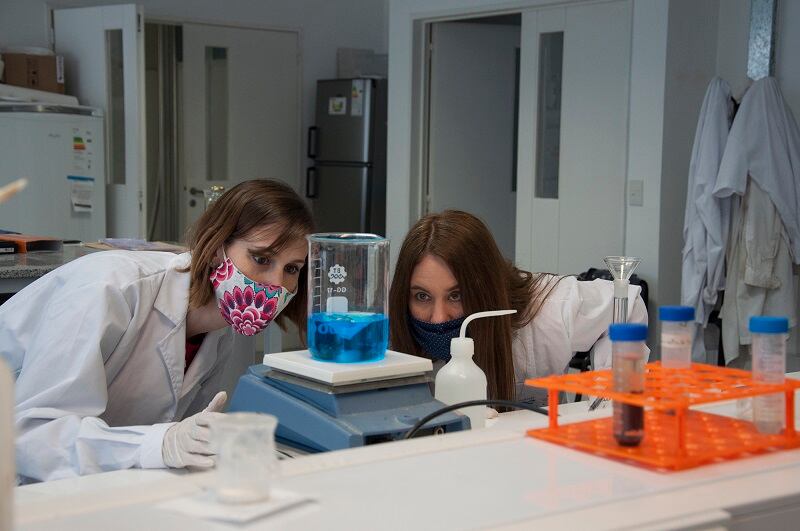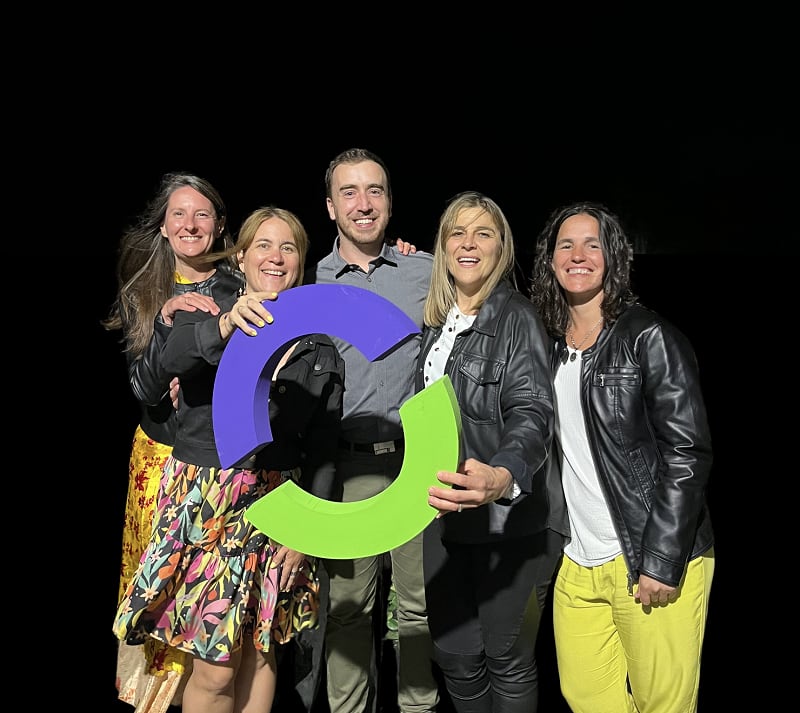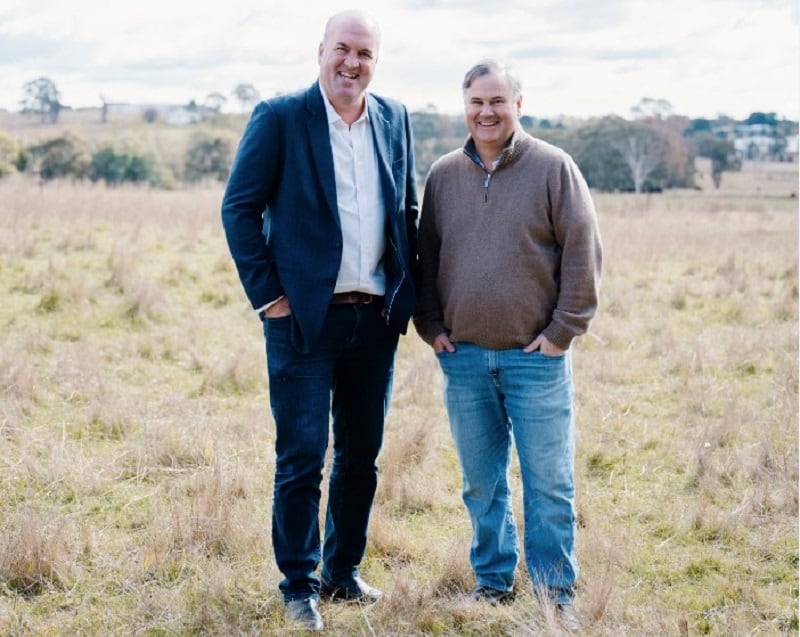ATN: What are you doing exactly and why?
MF: We are helping pesticide companies develop better versions of their products, focusing on reducing runoff in traditional synthetics and accelerating the adoption of biological alternatives. Our ultimate goal is to accelerate the shift away from chemicals in agriculture. We achieve this with our proprietary formulation technology: a microparticle that enhances plant uptake of crop protectants, pesticides, and fertilisers, allowing farmers to achieve the same results with up to 80% fewer applications.
ATN: How does Unibaio's technology work?
MF: Unibaio utilises natural materials like chitosan, a biodegradable natural polymer upcycled from shrimp waste, to design their microparticles. These microparticles are designed to trap different types of molecules (agrochemicals) and activate plants to absorb the particle. In this way, they act as carriers, trapping pesticides, fertilisers, and biological products and supercharging their penetration power. This leads to increased effectiveness and allows farmers to use significantly less product.
ATN: What are the main applications?
MF: Unibaio's technology has a two-pronged approach:
1. Reduction of chemical use: Farmers can significantly decrease their reliance on chemical pesticides and fertilisers by up to 80% while maintaining the same level of crop protection.
2. Boosting biological products: Their microparticles can improve the effectiveness of existing biological pest control and nutrient solutions, making them more competitive with traditional chemical options.
The technology is versatile and can increase the efficiency of a wide range of molecules (active ingredients) present in fungicides, herbicides, insecticides, and fertilisers, both synthetic and biological. The limitations of the technology rely on its ability to create attachment among the particles and the main active ingredients. As it is essentially sugar-based, it does not work well with bacteria-made pesticides, as they degrade the particle.
ATN: How does Unibaio's microparticle technology improve agro-inputs?
MF: All plants have evolved over millions of years to have the same receptors to detect fungi and insects that normally attack them. They do this by detecting chitosan, the material we use, which is also located on the surface of these pests. After more than 10 years of research in nanotechnology, we found a way to modify this chitosan polymer and create a particle that increases the range at which plants are activated. This mechanism is used for delivery purposes.
Additionally, we added the capability of creating physical and chemical attachments to a wide range of active ingredients to the particle. This allows the plant to absorb our particle and everything attached to it. This is relevant because most of what farmers apply on the farm today does not reach the target and is lost to wind, rain, and other factors, creating problems for humans and the environment.
ATN: What makes Unibaio's approach to reducing chemical use in agriculture unique?
MF: The idea of activating plants to uptake better is unique. Its scalability and versatility (all crops have the same receptors) make it possible to use this kind of formulation technology for mass-produced pesticides, like glyphosate, used on mass production crops like corn or soybeans.
Additionally, Unibaio's technology works with existing products, allowing farmers to integrate it seamlessly into their current practices without a complete overhaul. This makes adoption easier and reduces the learning curve.

ATN: How does Unibaio's technology contribute to sustainable farming practices
MF: By reducing reliance on chemicals (for example, achieving the same weed control with fewer chemicals in herbicide formulations), Unibaio promotes a more sustainable agricultural system. This translates to less environmental pollution from chemical runoff, improved soil health, and potentially reduced human exposure to harmful chemicals. Additionally, Unibaio's technology can help unlock new biological molecules and accelerate their go-to-market timing.
ATN: Can you share any details of field trials and results?
MF: We have conducted 42 field trials over two years, testing different types of agrochemicals, including herbicides, fungicides, and insecticides. Our technology showed a 40% reduction in glyphosate dose while maintaining the same weed control and achieving faster burn. We also achieved a 40% reduction in mancozeb, the most common fungicide used in banana and potato crops, while maintaining full control of botrytis. Additionally, we saw a 62% reduction in the most common diamide insecticide with the same results as the original full dose.
ATN: How did you secure your funding and build your team?
MF: We raised our pre-seed round from Bioceres, a strategic VC and the IndieBio SOSV (US). We also received grants from Argentina, Chile, and South Korea. We are currently raising our Seed round, led by specialised VCs. Our team is diverse, including mathematicians, chemists, biologists, agronomists, materials engineers, lab technicians, and business administration professionals.

We also have former managers from the chemical industry, such as Dupont, Syngenta, and Bayer. Our go-to-market strategy focuses on partnering with big players in the industry to develop new versions of their products under licensing agreements. We are currently working with seven large multinationals and aim to sign our first licensing agreements in 2025, with our technology expected to be on farms between 2025 and 2026.
ATN: What are your plans in the short and long term, and what are your biggest challenges?
MF: Unibaio's primary challenge is collaborating with industry players and convincing them to modify their products quickly to meet consumer demands. We are addressing this by including former industry managers in our team who understand the real pains and priorities of the industry and can make warm introductions to current managers. Raising a new round will accelerate the commercialisation process by helping us collect more data on the limits of the technology and the recommended way to formulate it, reducing the iteration process needed to create a new version of an old product.
ATN: What valuable lessons have you learned on your journey?
MF: This journey has taught us the true meaning of perseverance. We've discovered that turning dreams into reality demands relentless hard work. However, the most significant lesson has been the power of collaboration. Bridging the gap between science and business is challenging but essential for unlocking innovation. Disrupting an industry requires a unique blend of youthful enthusiasm and seasoned expertise. We've learned to embrace the challenge, knowing that the courage to challenge the status quo, combined with the wisdom of experience, is the key to real change.





